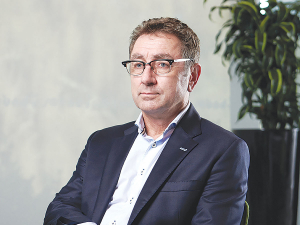Seeka returns to profitability after horror 2023
Kiwifruit and fresh produce handler Seeka will be bouncing back strongly from a big financial loss in 2023.
 Seeka chief executive Michael Franks says Covid, labour shortage, low fruit volumes and unfavourable weather all dented its half-year results.
Seeka chief executive Michael Franks says Covid, labour shortage, low fruit volumes and unfavourable weather all dented its half-year results.
A tough six months means produce company Seeka won’t pay an interim dividend to shareholders.
The company says Covid, labour shortage, low fruit volumes and unfavourable weather have all dented its halfyear results.
While revenue was up by 10% to $247.3m, earnings were impacted by increased costs and lower than expected fruit volumes. Gross earnings were down 2.3% to $30m, net profit rose 4% to $21.5m.
Seek chief executive Michael Franks told an investor briefing that the company’s operates in a seasonal business with substantial earnings coming in the first six months associated with harvest in New Zealand and Australia.
Franks says the board and management have reserved the decision to pay an interim dividend.
“We want to see more certainty around the full year earnings,” he says.
“This is prudent given where the industry and Seeka is at.”
The company is forecasting a “challenging second six months” and a full year net profit of between $9m and $11m. Last year the company reported a net profit of $23.5m.
Franks says the company faced a lot of headwinds in the first half of this year.
“It’s been a tough six months for the Group with a backdrop of Covid- 19, adverse weather events, extreme labour shortages, machine commissioning delays, shipping disruption, lower fruit yields and poor fruit quality all impacting performance.
“We have hunkered down, toughed it out and focused on the immediate job of optimising its operations and results in a volatile environment with significant inflationary pressure and geopolitical events affecting key markets.”
New Zealand kiwifruit crop volumes were well down on expectation across the industry.
In 2022, Seeka packed 43.3m trays of kiwifruit, above last year’s combined 40.7m trays.
Hayward volumes were down 24% and SunGold volumes were up 35.2%, both significantly impacted by yield per hectare reductions despite the additional fruit provided by the recent acquisitions.
The company says it has also endured a tight labour market exacerbated by illness.
Franks says loyal personnel, including support staff, were redeployed to “play-out-of position” at peak stress load to ensure the continuity of operations.
At one stage, Seeka was short of more than 1,100 people from its New Zealand seasonal workforce but managed to get through the harvest with an influx of RSE workers from the Pacific Islands.
The cost of labour has increased significantly Seeka competed to recruit staff to fully resource its operations.
Weather also played its part in a challenging harvest.
Late last year a storm in Opotiki destroyed an estimated 2 million trays of kiwifruit crops, while an unseasonably late maturing Gisborne kiwifruit region was then hit with heavy and continuous rain.
Franks says shipping delays disrupted the supply chain to market.
Fruit quality in 2022 was also poor.
Voting has started for the renewal of DairyNZ's milksolids levy.
The most successful catchment groups in NZ are those that have 'a source to sea' approach.
Associate Agriculture Minister and Manawatu dairy farmer Andrew Hoggard says the free trade agreement (FTA) negotiated with India is not a bad deal and his party, Act, will support it when it goes before Parliament.
Newly released data from Environment Canterbury (ECan) Farm Environment Plan (FEP) audits are showing a dramatic lift in environmental performance across the region.
A solid recovery of global dairy prices this year makes a $9.50/kgMS milk price almost a shoo-in for this season.
As New Zealand marks the United Nations’ International Year of the Woman Farmer 2026 (IYWF 2026), industry leaders are challenging the misconception that women only support farming.

OPINION: Here w go: the election date is set for November 7 and the politicians are out of the gate…
OPINION: ECan data was released a few days ago showing Canterbury farmers have made “giant strides on environmental performance”.